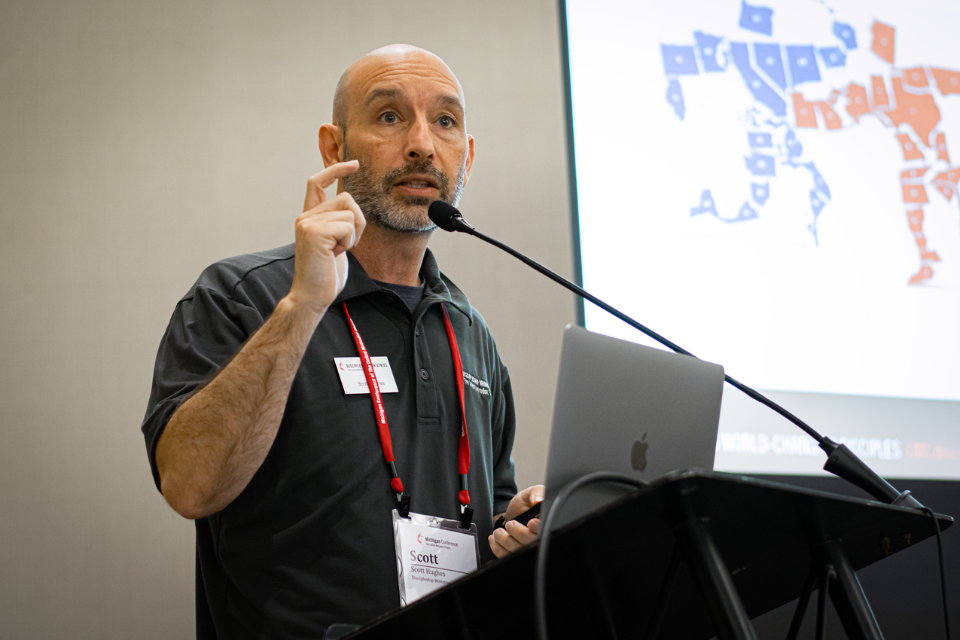At Annual Conference, Rev. Dr. Scott Hughes of Discipleship Ministries gave practical advice on how to have courageous conversations in a day when conflict and debate are the norm.
JOHN E. HARNISH
Michigan Conference Communications
We live in a day when conversation is difficult. The controversial issues of our times create an environment where conversation is often traded for conflict and dialogue for debate. Even in the church, which should be a place of healthy and honest conversation, our recent experience with disinformation and misinformation leading to disaffiliation has sometimes modeled the mood of the world around us rather than the spirit of Christ.
Rev. Dr. Scott Hughes, Associate General Secretary (World Service) at Discipleship Ministries, an agency of The United Methodist Church, met with clergy and lay members of the Michigan Annual Conference to share his teachings on courageous conversations.
His presentation began with Ephesians 4, where Paul instructs the church: “Be completely humble and gentle; be patient, bearing with one another in love. Make every effort to keep the unity of the Spirit through the bond of peace” (vv. 2-3). The same spirit is reflected in the Book of Discipline of The United Methodist Church, which describes our relationship as faithful members of the body of Christ: We are “bound in sacred covenant to shoulder the burdens, share the risks, and celebrate the joys of fellow members. A Christian is called to speak the truth in love, always ready to confront conflict in the spirit of forgiveness and reconciliation” (2016 Book of Discipline, ¶ 216).
Hughes defines courageous conversations as structured dialogue for learning, which calls for the courage to join and to stay. Here are some principles church leaders can put into practice in their congregations.
Learning
Hughes said learning begins with a willingness to “take the posture of curiosity,” an openness to others, and slowing down our biases and assumptions so we can hear what others have to say. Hughes said, “If we frame things in terms of learning, we will lean into the conversation.”
Dialogue
Dialogue is contrasted with debate, where the goal is to win. Dialogue invites the sharing of perspectives and the building of relationships. It includes a willingness to negotiate, saying, “I could be wrong, too.”
Structured
Courageous conversations don’t just happen. They require a structure. Hughes said to ask this essential question: “How do we develop structures that are capable of learning and dialogue?” He recommended beginning with the creation of a design team, part of whose responsibility would be to:
-
- develop a covenant,
- identify distinctives, potential issues, and the real need,
- design a structure,
- clarify the outcome,
- create the proper environment, and
- model the conversation for the congregation.
Hughes concluded his presentation with the words from Christena Cleveland’s book Disunity in Christ: Uncovering the Hidden Forces That Keep Us Apart: “We need to adopt the belief that to be a follower of Christ means to allow our identity as members of the body of Christ to trump all other identities” (p. 97).
Rev. Jeremy Africa, pastor at Otsego UMC, shared his experience with Hughes’ resources, which helped his congregation have meaningful conversations about their future. “It did not offer a magical answer,” he said, “but it enabled the people to be Christlike as they move toward difficult decisions.”
In a world of conflicted conversations, the church needs to model the ability to have courageous conversations within the body of Christ. Scott Hughes’ resources are one way of addressing that need. His book How to Have a Courageous Conversation is available at this link, and a four-session online course led by Hughes is available at this link.
Do you have questions or would like further information? Contact Rev. Dr. Scott Hughes directly at shughes@umdiscipleship.org.
Last Updated on June 11, 2024

